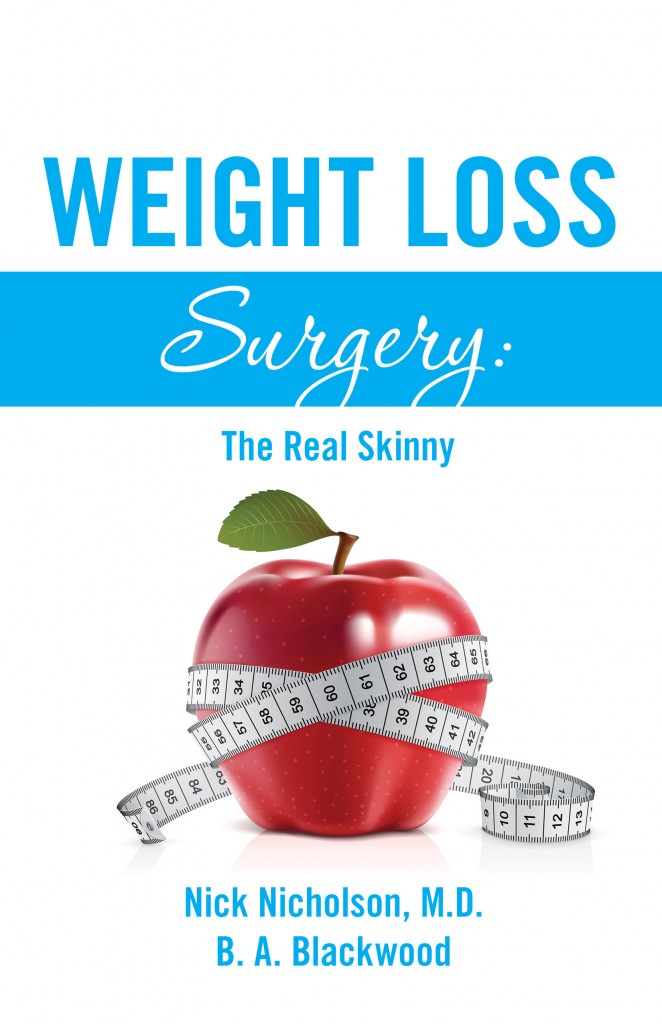 Weight Loss Surgery: The Real Skinny. Written by Dr. Nick Nicholson, one of the leading pioneers of weight loss surgery, and B. A. Blackwood, Weight Loss Surgery is a wonderful resource for those considering bariatric surgery or those who have already undergone surgery.
Weight Loss Surgery: The Real Skinny. Written by Dr. Nick Nicholson, one of the leading pioneers of weight loss surgery, and B. A. Blackwood, Weight Loss Surgery is a wonderful resource for those considering bariatric surgery or those who have already undergone surgery.
Weight loss surgery isn’t the easy way out. Successful weight loss surgery requires a fundamental life change. It’s not about your weight; it’s about your head.
Purchase on Amazon
Facts:
· 98% of morbidly obese people will fail at dieting
· Average age for Bariatric Surgery is 40
· Surgery can cure high blood pressure and diabetes
About the book:
Do you want to know the secret behind achieving and maintaining your ideal weight? Bariatric surgery can help you quickly lose weight, but maintaining the weight loss can be difficult. People often overeat for emotional reasons, so it’s less about what you’re eating and more about what’s eating you.
Dr. Nick Nicholson, a renowned bariatric surgeon, and B. A. Blackwood, an author, trial lawyer, and marathon runner, teamed up to write Weight Loss Surgery: The Real Skinny, a guide for people who are considering or have already undergone bariatric surgery. The authors are passionate about helping people achieve and maintain their ideal body weight, and they know that anyone who chooses to undergo bariatric surgery will experience bumps in the road to maintaining their weight loss. One size does not fit all—everyone’s body is unique and everyone faces a unique set of challenges. This guide is written to help readers adapt what they learn to fit their own circumstances.
Many people who undertake significant weight loss are surprised by the ways in which their relationships are affected. Some friends and family will be happy for you, but some will not. Some partners may be unhappy with the attention you now receive, while others feel challenged by the way your success makes them face their own shortcomings.
Written in an easy-to-read, engaging, and encouraging style that is supplemented with informational charts and data, Weight Loss Surgery: The Real Skinny tells you the whole story about bariatric surgery. The authors point out obstacles that patients face after surgery and offer encouragement and insights into how to change your thinking so you can maintain your ideal weight throughout your lifetime.
WHEN IS IT TIME TO SEE A WEIGHT LOSS SURGEON?
By Nick Nicholson, M.D. and B.A. Blackwood
You’ve gained and lost the same pounds over and over, as though the needle on
your scale is stuck in an arc between the same two numbers, except the number on the
upper end seems to be climbing up a bit. You’ve tried the diet recommended by your
best friend, and then the one you saw on Dr. Oz, and then the one your own doctor
recommended. But you always end up right back where you started.
You’re not alone.
The average bariatric patient has lost weight on a minimum of ten different diets
over the course of their weight battle. Losing weight has never been the real issue – it’s
been losing enough weight and keeping it off.
Most bariatric patients figure that their failure to lose weight and keep it off is
some sor of character flaw. If they were just more disciplined or had more time or more
focus, they’d be able to lose the weight.
Hunger fits right up there on the scale of physiological needs with air and thirst. In other
words, your need to satisfy hunger is just as strong as your need to breathe or to drink water after
you’ve been outside in the heat. It’s impossible to repress that need for extended periods of time,
but when you have a lot of weight to lose, that’s exactly what you’re asking your body to do.
Why? It has to do with your ghrelin level, the hunger hormone. When its levels are high,
you’re hungry. Once you eat, your ghrelin level goes back down, theoretically relieving your
hunger, and then rises again as the food digests. For reasons no one has quite figured out yet, the
ghrelin levels for an obese person on a diet are abnormally high all the time, regardless of
This means that the highest ghrelin level of a non-dieting person at a healthy weight right
before they eat – when they’re at their hungriest – is still lower than the obese person’s ghrelin
level right after they’ve eaten – when their ghrelin level is at their lowest.
Putting this in real life terms, let’s say you need to lose a hundred pounds and you go
on a sensible 1200 calorie a day diet designed to result in a one pound per week weight loss.
After you eat, your ghrelin levels will rise, resulting in your fullest sensation. But, your fullest
sensation on your sensible diet is equal to the hungriest sensation of your slim friend who
somehow only gained thirty pounds during her last pregnancy. No wonder so many people on a
diet complain that they’re always hungry.
To lose one hundred pounds, you’d have to maintain a 1200 calorie a day diet perfectly
for 23 months – 734 days – a feat requiring hand to hand combat with physiology that’s
screaming “feed me, feed me, feed me” at you every hour of the day. If you’re thinking as you
read this that this sounds almost impossible, you’re right.
That’s where weight loss surgery comes in.
The gastric bypass and gastric sleeve surgeries bypass the part of the stomach that
produces ghrelin. In other words, they take the hunger hormone off your back so that your diet
can work, for anywhere from six to eighteen months following the surgery.
For a time, the ghrelin levels following surgery won’t even reach the hunger level of a
non-dieting person. This won’t last forever, and other hormones will eventually take over the
ghrelin hormone’s job. However, the surgeries can trick your physiology for long enough to
allow you to lose a significant amount of weight, giving you time to get in the behavior
modification groove of less food, more exercise, and the development of habits designed to last
you the rest of your life.
Lowering ghrelin levels won’t address your emotional hunger – that voice inside your
head that drives you to eat under stress – but it’s a useful tool. During the six to nine month
period of maximum ghrelin suppression you’ll learn what it feels like to “need” food versus
“want” food. You’ll be at the controls of your own biofeedback laboratory, getting the knack
of reading the signals your body sends you when it’s low on glucose and needs fuel without the
noise of a faulty ghrelin message clouding the communication.
If you’re significantly overweight and haven’t made progress through traditional dieting,
it’s probably time to get out of the diet rut and consider bariatric surgery. It may just be your best
and only shot at getting to a healthy weight.
And, at the end of the day, getting healthy is what it’s all about.
 Dr. Nick and B.A. are co-authors of Weight Loss Surgery: The Real Skinny. Dr. Nick is one of the most renowned bariatric surgeons in the country and is a recognized expert on obesity and its treatment. Find out more about him at www.nicholsonclinic.com. B.A. Blackwood is an author, trial lawyer and marathoner. Find out more about her at www.bablackwood.com.
Dr. Nick and B.A. are co-authors of Weight Loss Surgery: The Real Skinny. Dr. Nick is one of the most renowned bariatric surgeons in the country and is a recognized expert on obesity and its treatment. Find out more about him at www.nicholsonclinic.com. B.A. Blackwood is an author, trial lawyer and marathoner. Find out more about her at www.bablackwood.com.






